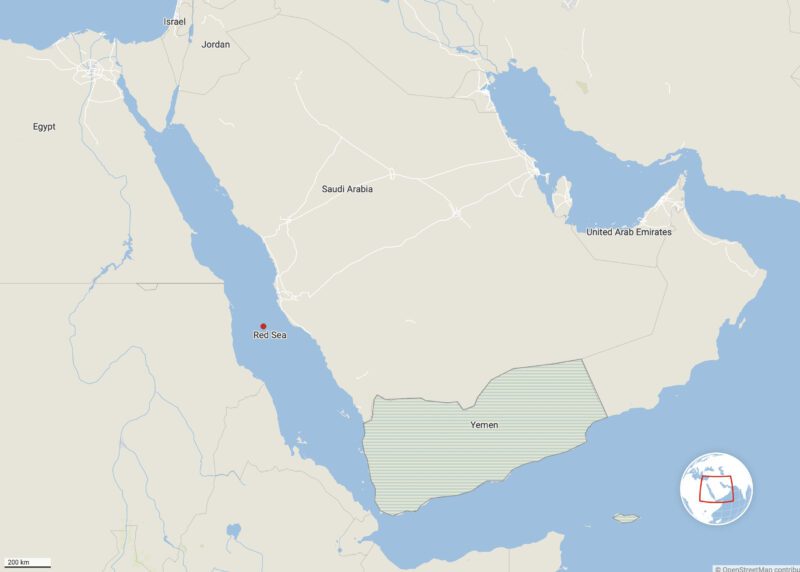With insurance rates soaring ten-fold, a $100 million ship might require a 1% war premium just to sail through the Red Sea, combined with the expenses of convoys/naval protection, the Houthis are imposing serious costs on using the Suez canal route.
The alternative, sailing around the southern tip of Africa has been much discussed in the trade and general media and the upshot is: they and their Iranian backers have the world in a bit of a quandary.
From gCaptain, January 15:
The U.S.- and U.K.-led strikes on the rebel Houthi group in Yemen represent a dramatic new turn in the Middle East conflict – one that could have implications throughout the region.
The attacks of Jan. 11, 2024, hit around 60 targets at 16 sites, according to the U.S. Air Force’s Mideast command, including in Yemen’s capital Sanaa, the main port of Hodeida and Saada, the birthplace of the Houthis in the country’s northwest.
The military action follows weeks of warning by the U.S. to the Houthis, ordering them to stop attacking commercial ships in the strategic strait of Bab el-Mandeb in the Red Sea. The Houthis – an armed militia backed by Iran that controls most of northern Yemen following a bitter near-decadelong civil war – have also launched missiles and drones toward Israel.
As an expert on Yemeni politics, I believe the U.S. attacks on the Houthis will have wide implications – not only for the Houthis and Yemen’s civil war, but also for the broader region where America maintains key allies. In short, the Houthis stand to gain politically from these U.S.-U.K. attacks as they support a narrative that the group has been cultivating: that they are freedom fighters fighting Western imperialism in the Muslim world.
For Houthis, a new purpose
The Israel-Gaza conflict has reinvigorated the Houthis – giving them a raison d’etre at a time when their status at home was diminishing.
By the time of the Oct. 7 attack by Hamas militants in Israel, the Houthis’ long conflict with Saudi Arabia, which backs the Yemeni government ousted by the Houthis at the start of Yemen’s civil war in 2014, had quieted after an April 2022 cease-fire drastically reduced fighting.
Houthi missile strikes on Saudi cities ceased, and there were hopes that a truce could bring about a permanent end to Yemen’s brutal conflict.
With fewer external threats, domestic troubles that surfaced in Houthi-controlled areas – poverty, unpaid government salaries, crumbling infrastructure – led to growing disquiet over Houthi governance. Public support for the Houthis slowly eroded without an outside aggressor to blame; Houthi leaders could no longer justify the hardships in Yemen as a required sacrifice to resist foreign powers, namely Saudi Arabia and United Arab Emirates.
But Israel’s attacks in Gaza have provided renewed purpose for Houthis. Aligning with the Palestinian cause has allowed Houthis to reassert their relevance and has reenergized their fighters and leadership.
By firing missiles toward Israel, the Houthis have portrayed themselves as the lone force in the Arab Peninsula standing up to Israel, unlike regional powers such as Saudi Arabia and Egypt. The militia is presenting to Yemenis and others in the region a different face than Arab governments that have, to date, been unwilling to take strong action against Israel.
In particular, Houthis are contrasting their worldview with that of Saudi Arabia, which prior to the October Hamas attack had been looking to normalize ties with Israel.

A Map of Yemen and the Red Sea
Houthi’s PR machine
The U.S. and U.K. strikes were, the governments of both countries say, in retaliation for persistent attacks by Houthis on international maritime vessels in the Red Sea and followed attempts at a diplomatic solution.The aim is to “disrupt and degrade the Houthis’ capabilities,” according to U.S. Secretary of Defense Lloyd Austin.
But regardless of the intent or the damage caused to the Houthis militarily, the Western strikes may play into the group’s narrative, reinforcing the claim that they are fighting oppressive foreign enemies attacking Yemen. And this will only bolster the Houthis’ image among supporters.....
....MUCH MORE